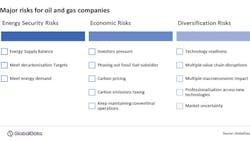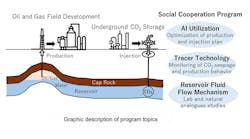Editor's note: This article first appeared in the 2023 Executive Perspectives Special Report, which published within the November/December 2023 issue of Offshore magazine.
By Barbara Monterrubio, GlobalData
Calls to tackle climate change are in continuous rise, and oil and gas companies must prepare to shift away from conventional operations to keep aligned with an evolving and decarbonizing world. There is a growing consensus within international organizations that the way in which energy is produced, distributed and consumed needs to be radically altered to avoid catastrophic climate change. However, this change needs to take place while ensuring energy security, which might be at risk if the transformation goes too fast. Therefore, a decisive pivot toward a diverse suite of renewable energy sources will be critical.
Additionally, as energy transition efforts ramp up globally, the pressure on the oil and gas industry to decarbonize and meet global targets increases as well. Currently, leading oil and gas companies have set emissions reduction targets and strategies, relying on both existing and emerging technologies. As part of the existing technologies, they are heavily investing in renewables power generation, with wind and solar power being particular interest areas. New emerging technologies strategies rely more on being early movers in biofuels production, production and use of low-carbon hydrogen, and the installation of carbon capture technologies across their assets. Other additional areas of interest also include expanding the offering of electric vehicle charging points and batteries development, as well as circular economy initiatives.
Even when oil and gas companies have demonstrated to be resilient in a decarbonizing world, their transformation is still underway. Partly because making business outside their core operations will involve facing multiple industry challenges creating risks for transitioning at a faster pace. Most of these risks can be allocated within energy security, economic and diversification risks.
Energy security risks
Energy security is now on top of the agenda for policymakers and governments across the world. Not even the richest nations are in a position to eliminate oil and gas demand without risking an energy market and economic fallout. This is supposed to be one of the main risks of any oil and gas company, as they must ensure an energy supply to cover the market while they shift to cleaner technologies. Keeping this balance would imply a risk, in a sense that if they don’t move away fast enough from fossil fuels, they won’t meet decarbonization targets and might be penalized. On the other hand, if oil and gas companies don’t have a smooth transition and bring all attention and investments into cleaner energy sources, then the energy market will collapse.
Economic risks
In addition to government pressure, investor pressure has prompted oil and gas companies to undertake decarbonization in their operations. Funding institutions have turned to supporting low-carbon fuels and green technologies, phasing out coal and fossil fuel subsidies, and making any upcoming investment in oil and gas assets even more difficult to get. As well as undertaking the implied costs of shifting away from conventional operations, while maintaining and upgrading their traditional processes, the increasing carbon pricing and carbon emissions taxes have now to be as well considered into a company’s financials.
Diversification risks
As companies are now playing across multiple technologies, this will imply being more susceptible to value chain disruptions. There is a macroeconomic impact from major economies as China, India and the US will have a greater effect on supplies across different technologies. In this sense, companies would need to set clear objectives on which clean technologies to add as part of a diversified portfolio. Another related risk is that the required knowledge needed for new technologies would be different and will require training of their company staff across different activities in the new sectors. Also, there exists some uncertainty across the future market of nascent technologies such as hydrogen and sustainable fuels, hence cautiousness on investing and moving fast is essential.
About the author: Barbara Monterrubio is a managing analyst with GlobalData.



